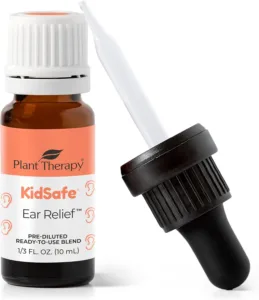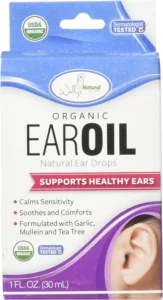
Ear infections are a common ailment that can cause discomfort and pain, particularly in children. If you or your loved ones have experienced the agony of an ear infection, you know how crucial it is to find effective relief. While there are traditional treatments available, such as antibiotics and pain medication, many people are turning to natural remedies like essential oils. In this comprehensive guide, we will explore the best essential oils for ear infections, their benefits, and how to use them safely and effectively. Find the best essential oils for ear infection.[1]
Top Best Essential Oils for Ear Infection
Now that we understand the potential benefits of essential oils, let’s explore some of the best options for treating ear infections.
-
Lavender Oil for Ear Infections
Lavender oil is renowned for its calming and soothing properties. It can help relieve pain associated with ear infections and promote relaxation, making it ideal for bedtime use. Dilute a few drops of lavender oil with a carrier oil such as coconut or olive oil, and gently massage it around the ear, avoiding direct contact with the ear canal.
In addition to its pain-relieving properties, lavender oil also has antimicrobial properties that can help fight off any infection-causing bacteria. This makes it an excellent choice for addressing the root cause of the ear infection while providing relief from discomfort.
Furthermore, lavender oil has been found to have anti-inflammatory effects, which can help reduce swelling and inflammation in the ear. By applying diluted lavender oil around the ear, you can potentially alleviate some of the discomfort and pressure associated with ear infections.
-
Tea Tree Oil for Ear Infections
Tea tree oil is well-known for its powerful antimicrobial properties. It can help fight off the bacteria or fungi causing the infection. Mix a few drops of tea tree oil with a carrier oil, soak a cotton ball in the mixture, and place it at the entrance of the ear canal for a few minutes. Avoid inserting it deep into the ear.
In addition to its antimicrobial effects, tea tree oil also has anti-inflammatory properties. This can help reduce inflammation and swelling in the ear, providing relief from pain and discomfort. By using tea tree oil as a natural remedy for ear infections, you can potentially address both the infection and the symptoms it causes.
It is important to note that tea tree oil should always be diluted before use, as it can be too strong and potentially irritate the skin. By diluting it with a carrier oil, you can safely and effectively use tea tree oil to treat ear infections.
-
Basil Oil for Ear Infections
Basil oil has natural analgesic and anti-inflammatory properties, helping to reduce pain and inflammation associated with ear infections. Dilute a few drops of basil oil with a carrier oil, and apply it around the ear using a clean cotton ball or swab. Be cautious not to put anything directly inside the ear canal.
In addition to its pain-relieving and anti-inflammatory effects, basil oil also has antimicrobial properties. This means that it can help fight off the infection-causing bacteria, promoting faster healing and recovery from the ear infection.
Furthermore, basil oil has been used traditionally for its warming properties. By applying diluted basil oil around the ear, you can potentially improve blood circulation in the area, which can aid in the healing process and provide additional relief from pain and discomfort.
It is important to remember that essential oils should always be used with caution and in moderation. If you experience any adverse reactions or if the symptoms worsen, it is recommended to consult a healthcare professional for further guidance.[2][3]
Top 3 Brands of Best Essential Oils for Ear Infection
- Plant Therapy KidSafe Ear Relief. Experience the comforting relief of Ear Relief Essential Oil Blend—a gentle solution designed to soothe ear discomfort and congestion. Crafted with a kid-safe formula, it’s suitable for both adults and children ages 2 and up. This blend features a harmonious combination of Lavender, Rosalina, Tea Tree, Palmarosa, and Roman Chamomile essential oils, expertly pre-diluted with Hemp Seed Carrier Oil for your convenience. Whether you’re seeking relief from ear congestion, discomfort, or irritation, Ear Relief is your natural remedy. Simply apply 1-3 drops on the outside of the ear, gently massage, and let the soothing begin. Always check with your doctor before use.
 Plant Therapy KidSafe Ear Relief
Plant Therapy KidSafe Ear Relief
- Marie Originals Organic Ear Oil. Nurture your ears with the natural goodness of Earth-Derived Ear Health drops. Amidst the daily cacophony of life, these all-natural drops provide the tender care your ears deserve. Ideal for daily use, they act as a protective shield against infections, offer relief during seasonal allergies, and soothe ear sensitivity as needed. Embrace the botanical bliss of this treatment, crafted with nourishing herbs and essential oils like mullein, calendula, and St. John’s Wort. These drops not only support ear health but also contribute to overall immune well-being. Pamper your ears with the gentle yet powerful care they need.
- Wally’s Natural Products Organic Ear Oil. Nurture your ears with the soothing touch of Herb-Infused Ear Oil. Crafted as a no-sting, alcohol-free formula, this organic blend promotes good ear health. Infused with the purest ingredients, including sweet almond, eucalyptus, tea tree, Echinacea, and garlic oils, it creates a unique and smooth combination to soothe sensitive ears. Hand-prepared with whole herb infusions and aromatherapy essential oils, this healthy ear oil provides maximum protection against ear pain. Immerse yourself in the calming relief of these ear drops, designed to ease discomfort after ear candling. Embrace the support for healthy ears with the natural goodness of this organic ear oil.
 Wally’s Natural Products Organic Ear Oil
Wally’s Natural Products Organic Ear Oil
Understanding Ear Infections
Before delving into the world of essential oils, it is essential to have a basic understanding of ear infections. Ear infections occur when the middle ear becomes inflamed and infected, often as a result of bacteria or viruses. They are more common in children due to their smaller and more horizontal Eustachian tubes, which can become easily blocked.
When the Eustachian tubes become blocked, it creates a perfect environment for bacteria or viruses to thrive. The blockage can be caused by various factors, such as respiratory infections, allergies, smoking, and exposure to high levels of air pollution. These factors compromise the normal functioning of the Eustachian tubes, allowing harmful microorganisms to enter and cause an infection.
The symptoms of an ear infection can vary depending on the severity and age of the individual. Common symptoms include earache, fever, hearing loss, fluid drainage from the ear, and irritability in children. It is important to note that these symptoms can also be indicative of other conditions, so it is crucial to consult a healthcare provider for a proper diagnosis.
Treatments for Ear Infections
Traditional treatments for ear infections often involve antibiotics to combat bacterial infections and pain medication to alleviate discomfort. While these treatments can be effective for many individuals, they may come with side effects and are not always the best option for everyone.
Now, let’s explore the world of essential oils and how they can potentially offer a natural and alternative approach to managing ear infections. Essential oils have gained popularity in recent years for their potential therapeutic benefits. These concentrated plant extracts contain various compounds that possess antimicrobial, anti-inflammatory, and analgesic properties.
When it comes to ear infections, certain essential oils have been studied for their potential effectiveness in combating bacterial or viral infections. For example, tea tree oil has shown antimicrobial properties, which may help fight off the bacteria responsible for ear infections. Eucalyptus oil, known for its anti-inflammatory properties, may help reduce inflammation in the middle ear and alleviate pain.
It is important to note that while essential oils may offer potential benefits, they should not replace traditional medical treatments. If you suspect an ear infection, it is crucial to consult with a healthcare provider for an accurate diagnosis and appropriate treatment plan. They can provide guidance on the safe and proper use of essential oils if deemed appropriate for your specific situation.
Ear infections can be a painful and uncomfortable condition, especially for children. Understanding the causes, symptoms, and traditional treatments can help individuals make informed decisions about their healthcare. Exploring alternative options, such as essential oils, can be an additional avenue to consider under the guidance of a healthcare professional.
The Role of Essential Oils in Health and Wellness
Essential oils have been used for centuries in various cultures for their therapeutic properties. These aromatic plant extracts contain compounds that can have positive effects on our physical and emotional well-being.
Let’s delve deeper into the fascinating world of essential oils and explore the science behind their remarkable benefits.
The Science Behind Essential Oils
Essential oils consist of volatile compounds that are extracted from plants through methods like distillation or cold pressing. These compounds have unique properties that can provide a range of health benefits, including antimicrobial, anti-inflammatory, and analgesic effects.
Each essential oil contains a complex mixture of these compounds, which gives them their distinct aroma and therapeutic properties. For example, lavender essential oil contains linalool and linalyl acetate, compounds known for their calming and relaxing effects.
When inhaled or applied topically, these volatile compounds interact with our body’s receptors, triggering various physiological responses. The molecules of essential oils are small enough to penetrate our skin and enter our bloodstream, allowing them to exert their therapeutic effects throughout our body.
Research has shown that different essential oils can have specific effects on our body and mind. For instance, tea tree oil has been found to possess powerful antimicrobial properties, making it a popular choice for treating skin infections and promoting wound healing.
Furthermore, essential oils can also have a profound impact on our emotional well-being. The aroma of certain oils, such as citrus oils like lemon or bergamot, can uplift our mood and promote feelings of positivity and relaxation.
Benefits of Using Essential Oils
When it comes to ear infections, essential oils offer several advantages. They can help alleviate pain and inflammation, reduce the presence of harmful bacteria, and support the body’s natural healing process. Unlike pharmaceuticals, essential oils often have fewer side effects and can be a more natural option.
For example, eucalyptus essential oil has been traditionally used to relieve congestion and promote respiratory health. Its anti-inflammatory properties can help soothe irritated airways, making it an excellent choice for individuals suffering from respiratory conditions like bronchitis or sinusitis.
Another popular essential oil for ear infections is chamomile oil. Chamomile is known for its calming and anti-inflammatory effects, which can help reduce pain and discomfort associated with ear infections. Applying a warm compress infused with chamomile oil can provide soothing relief and promote faster healing.
It’s important to note that while essential oils can offer significant benefits, they should be used with caution. Some oils may cause skin irritation or allergic reactions in certain individuals. It’s always advisable to dilute essential oils with a carrier oil before applying them topically and to perform a patch test before using them for the first time.
Furthermore, essential oils should not be ingested unless under the guidance of a qualified healthcare professional. Ingesting essential oils can be toxic and may lead to adverse effects on our health.
Essential oils have a long history of use in promoting health and wellness. Their unique properties and therapeutic benefits make them a valuable addition to our self-care routines. Whether it’s relieving pain, reducing inflammation, or enhancing our emotional well-being, essential oils offer a natural and holistic approach to supporting our overall health.[7][8][9]
How to Use Essential Oils for Ear Infections
Now that we’ve covered some of the best essential oils for ear infections, let’s discuss the various ways you can use them safely and effectively.
Topical Application of Essential Oils
One of the most common methods of using essential oils is through topical application. Before applying any essential oil, dilute it with a carrier oil to avoid skin irritation. Gently massage the diluted oil around the external ear and along the jawline to help relieve pain and reduce inflammation.
When it comes to choosing a carrier oil, there are several options to consider. Coconut oil, olive oil, and sweet almond oil are all popular choices. These carrier oils not only help dilute the essential oil but also provide additional moisturizing benefits for the skin.
It’s important to note that not all essential oils are safe for direct skin contact. Some oils may cause irritation or allergic reactions. Always do a patch test on a small area of skin before applying the diluted essential oil to your ear. This will help ensure that you don’t have any adverse reactions.
Aromatherapy and Essential Oils
Aromatherapy can also be beneficial for ear infections. By diffusing essential oils into the air, you can inhale their therapeutic vapors, which may help alleviate symptoms and promote relaxation. Use an essential oil diffuser or add a few drops of oil to a bowl of steaming water, making sure to close your eyes and inhale deeply.
When choosing essential oils for aromatherapy, consider oils that have antimicrobial and anti-inflammatory properties. Tea tree oil, lavender oil, and eucalyptus oil are all excellent options. These oils not only help fight off infection-causing bacteria but also provide a soothing and calming effect.
To enhance the effectiveness of aromatherapy, create a relaxing environment. Dim the lights, play soft music, and create a comfortable space where you can fully immerse yourself in the healing properties of essential oils. Take deep breaths and allow the aroma to envelop your senses, providing a sense of relief and tranquility.
Essential Oils and Steam Inhalation
Steam inhalation can provide relief by opening up the Eustachian tubes and promoting drainage. Add a few drops of essential oil to a bowl of hot water, drape a towel over your head, and inhale the steam for about 10 minutes. This method can help reduce congestion and ease pain.
When using steam inhalation with essential oils, it’s important to choose oils that have decongestant and expectorant properties. Peppermint oil, eucalyptus oil, and rosemary oil are all excellent choices. These oils can help clear the nasal passages and reduce inflammation, allowing for better airflow and drainage.
As you inhale the steam, take slow and deep breaths, allowing the therapeutic properties of the essential oils to penetrate your respiratory system. This method not only provides relief for ear infections but can also help alleviate sinus congestion and respiratory issues.
Remember, it is essential to consult with your healthcare provider before using essential oils, especially if you have any underlying health conditions or are pregnant. They can provide guidance tailored to your specific needs and ensure the safe usage of essential oils.
When it comes to finding natural relief for ear infections, essential oils can be a valuable tool in your self-care arsenal. Their diverse therapeutic properties and minimal side effects make them an appealing alternative to traditional treatments. By understanding the causes and symptoms of ear infections, choosing the right essential oils, and utilizing safe application methods, you can take control of your health and well-being.
So why not explore the world of essential oils and discover the potential benefits they hold for your ear health? Whether through topical application, aromatherapy, or steam inhalation, essential oils offer a natural and holistic approach to managing ear infections. Embrace the power of nature and unlock the healing potential of essential oils today![10][11]
Use the CareClinic App to Monitor your Healthcare Journey for Ear Infections
As you explore the natural benefits of essential oils for ear infections, the CareClinic App can be an invaluable partner in managing your health journey. With the ability to track symptoms, monitor treatment progress, and log the use of essential oils, CareClinic helps you understand the effectiveness of your natural remedies. The app’s features allow you to record any changes in pain levels, frequency of infections, and overall well-being, providing you with actionable insights into your health. By staying informed and proactive with the CareClinic App, you can achieve improved health outcomes and take control of your ear health. To start your journey towards better ear care with the support of technology, Install App today and discover how tracking your treatment with essential oils can lead to a healthier you.[12]
References
- “Can Essential Oils Treat an Ear Infection?”. https://health.clevelandclinic.org/essential-oils-for-ear-infection
- “Effect of Lavender (Lavandula angustifolia) Essential Oil on Acute Inflammatory Response – PMC”. https://pmc.ncbi.nlm.nih.gov/articles/PMC5878871/
- “Tea tree oil: in vitro efficacy in otitis externa”. https://pubmed.ncbi.nlm.nih.gov/15845191/
- “Plant Therapy KidSafe Ear Relief Essential Oil Blend Pre-Diluted 10 mL (1/3 oz) 100% Pure, Therapeutic Grade – Walmart.com”. https://www.walmart.com/ip/Plant-Therapy-KidSafe-Ear-Relief-Essential-Oil-Blend-Pre-Diluted-10-mL-1-3-oz-100-Pure-Therapeutic-Grade/114682208
- “Customer reviews for Marie Originals Natural Ear Oil Drops | Mullein Garlic Oil Ear Drops for Infections Prevention, Herbal Ear Ache Drops for Adults, Kids & Pets, Soothes Ear Pain & Wax Removal, Earache Remedies (1Pack) | Walmart.com”. https://www.walmart.com/reviews/product/891548219
- “Ear Relief KidSafe Essential Oil – Plant Therapy”. https://www.planttherapy.com/products/ear-relief-kidsafe-essential-oil
- “Essential oils, their therapeutic properties, and implication in dentistry: A review – PMC”. https://pmc.ncbi.nlm.nih.gov/articles/PMC4606594/
- “Reduce Ear Pain and Earache Discomfort with Essential Oils”. https://naturalhomeremedies.page/essential-oils-for-earache/
- “Essential oil”. https://en.wikipedia.org/wiki/Essential_oil
- “Essential Oils for Ear Infection: Natural Relief – Acibadem Health Point International”. https://www.acibademhealthpoint.com/essential-oils-for-ear-infection-natural-relief/
- “What Essential Oils for Ear Infection – Oil Therapy Central”. https://oiltherapycentral.com/blogs/essential-oils/essential-oils-for-ear-infection/
- “Effective treatment of experimental acute otitis media by application of volatile fluids into the ear canal – PubMed”. https://pubmed.ncbi.nlm.nih.gov/15871121/


 Organic-Ear-Oil
Organic-Ear-Oil